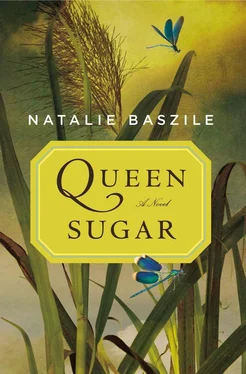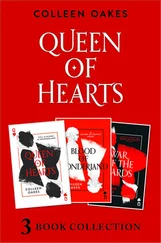“That’s right.”
“But you promised we’d spend more time together,” Micah said, bright tears pooling. “Why did you say that if you didn’t mean it? I hate when you do that. You’re such a liar.” She tore the flyer to pieces and ran around the side of the house.
Blue clapped his hand over his mouth and stared at Charley.
“Yes, I know, sweetheart. She said a bad word.” Charley gathered the pieces of flyer, then put her hand on Blue’s slim shoulder. “Go inside. We’ll be there in a sec.”
Micah, thankfully, had not gone far. In her garden, using one of Miss Honey’s old hoes, she hacked at the weeds around the lone soccer-ball-size pumpkin that had survived the storm. With every swing, she gave a small, furious grunt.
“Micah.” Charley stepped closer then paused. She wouldn’t lecture. She wouldn’t press. Instead, she grabbed a rake and gathered the grass and weeds into a pile.
“I don’t need your help.”
But Charley kept raking. “A couple more weeks, it’ll be perfect for Halloween,” she said.
“Leave me alone. I told you. I can do this by myself.”
“Sweetheart.” Charley knelt beside the pumpkin and brushed dirt off the coarse orange skin, warm after a full day in the sun. She felt the urge to draw the pumpkin to her and let the heat seep into her bones. “I’m sorry. I know this is hard. Just give me—”
Micah stopped hoeing and glared at her. Then, without another word, she raised her hoe and chopped the pumpkin to bits.
• • •
By Los Angeles standards, the carnival was almost shabby with its rickety rides and crummy gaming booths and shady food stalls lining the perimeter. But there was something about it, too — the sound of folks screaming as the roller coaster clattered over the tracks, the bells ringing, the buzzers at the shooting range wheezing, the smell of funnel cakes and fried crawfish tails — that felt like pure magic, and Charley thought again, yes , this was exactly the distraction she needed.
She had not seen this many people in one place since she’d arrived in Saint Josephine. Teenagers moved about in clusters, laughing too loudly. Thin young men and their plump, soft-armed wives pushed strollers loaded with the oversize plush toys they won at the ring toss. A hodgepodge of people, black and white, Asian and Latino. Charley loved the rich mix of their voices, the lilting, sensuous phrases and singsong dialects. It was as though she were meandering through a tropical garden, a riot of color and sound, and she was grateful to be able to claim south Louisiana with its strange and extraordinary people.
• • •
Charley was Blue and Micah’s age, maybe younger, the last time she went down a giant carnival slide, but she stepped into the burlap sack and scooted forward on her rear end anyway; and when Blue declared he would beat them to the bottom, Charley raised the stakes and said the winner got to choose the next ride; and all of a sudden, she wanted to win more than anything. And maybe it was because so many people had used the burlap sack before her that its coarseness had been worn away, or maybe it was because the slide was freshly waxed, but the speed took Charley by surprise and she screamed at the top of her voice. Micah and Blue screamed too, and Micah swore in French, which Charley heard but didn’t scold her for because it was all in good fun and hilarious besides. At the bottom, they laughed so hard Charley almost wet her pants and they forgot to declare a winner, and then Charley tore three more tickets from the roll and said, “Who wants to go again?” Eventually, though, as the evening wore on, Charley surrendered: no more rides that spun or twisted or flipped. “I’ll get the food,” she said, and agreed to meet the kids at the exit from the Tilt-A-Whirl.
The crawfish pie line was the longest, which meant, she hoped, their food was the best. Charley listened to the conversations around her as she waited. Behind her, a couple argued about how they’d stretch their Christmas budget and still get their car fixed. One person ahead of her, Charley watched a man carry a small girl on his shoulders while doing his best to hold the hands of two little dark-haired boys. The boys were Blue’s age — five or six — and just like Blue, they couldn’t stand still. Charley noticed how patient and gentle the man was as the line inched forward. He didn’t scold the little boys when they kicked up dust with their cowboy boots; he didn’t raise his voice at the little girl when she whined that she was getting hungry. Charley was tempted to tell him how nice it was to see a father take time with his children.
“Y’all want to get something for your mama?” the man asked. “What would she like?”
His voice was steady and warm and strangely familiar. How did she know that voice? Charley watched as they stepped up to the window; how, with one easy movement, the man swung the little girl down from his shoulder; how he peeled the boys’ small hands off the ledge as they tried to peer into the booth as he placed his order, which took a while, since the little boys kept changing their minds. Finally, the man stepped aside.
“I beg your pardon,” he said, apologizing to the man standing behind him, and when he looked back, Charley saw his face. It was Remy.
For a moment, neither spoke.
Charley stared at Remy while the children squirmed and the woman at the window shouted for people to pick up their orders. Then Remy seemed to draw himself up, discomfort replacing the surprise in his expression.
“Hello, Charley.”
“Remy,” Charley fumbled. “I didn’t see you — I mean, I’m surprised — what are you—”
The man in front of Charley placed his order.
“Step up, please,” said the woman at the window. “Who’s next? Please, ma’am, step up to the window or move to the side so the people behind you can order.” Charley heard the woman, but didn’t move until Remy took her gently by the elbow, easing her out of line.
“How’ve you been?” He held her elbow for a moment longer than he needed to, then released her, but it was enough to remind Charley of the way he’d held her at Paul’s Café.
Charley blinked. “How’ve I been?” Not so good. Terrible, in fact. Don’t get me started. “I’m okay — I mean, I’m fine — busy.” She looked down at the boys, then back at Remy. “How are you?”
“Good,” Remy said. The boys started bickering and he ruffled their soft curls. “Y’all stop fooling around and say hello to Miss Charley.” He patted their heads. “This is Trevor and this is Braxton.” The little girl yanked Remy’s pant leg and he lifted her onto his shoulders again. She held on by a tuft of his hair, which was longer than Charley remembered. “And this is Annabel.”
“I’m four,” Annabel said, holding up her small hand. She had olive skin like her brothers, and her hair was divided into two long braids.
“Four years old means you’re a big girl,” Charley said. She smiled at the boys. If Remy said these children belonged to his new girlfriend, even though he was entitled to date whomever he wanted and she was the one who dumped him, Charley knew she would have to excuse herself politely and walk away. Her heart squeezed a little as she held her breath and waited for him to say more. But he didn’t. “So,” she floundered.
Remy hesitated. “Y’all getting through planting okay?” He looked thinner, tired. But that easy way — it practically rose off his body like vapor.
“More or less,” Charley said. Thought, More like less .
The woman at the window called Remy’s order. He ignored her. “That’s good. You’re lucky.” He seemed genuinely relieved. “Lot of farmers lost half of what they planted.”
Читать дальше












